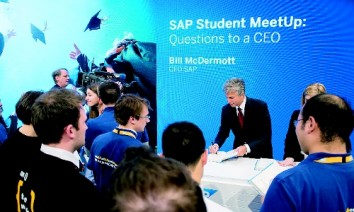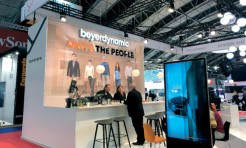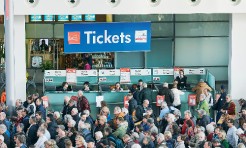How do you ensure the security of people at events?
As an organiser of our own events and a
participant in external events, security is very close to our heart. This means
the personal, physical safety of our customers, partners, employees and
suppliers at the event as well as data security, technical security, financial
security and, not least, perceived safety and security – before, during and
after an event.

Expert:
Mathias Sondermann
Director Global Events
SAP
Selecting the destination
We carry out a risk analysis at this point:
What are the potential dangers in the region or city and at the event venue?
Aspects of this include the political situation, physical security (from
terrorism, for example), data protection and the security of the infrastructure
(airport, public transport, roads, power supply).
Formation of a team
Months before the event, a team is formed that is regularly updated and can react as required. This team consists covers mobility (transport and accommodation), communication (regular communication and crisis communication), legal aspects and human resources, risk and compliance. In addition, a crisis team is set up in advance. This team is prepared and briefed about what to do in a crisis. In the event of one occurring, the team handles crisis management and collaborates with the venue, the police and the fire service, for example. The comprehensive security plan is based on the risk analysis and takes goes into detail on the operational aspects: the selection of local service providers, admission and access control, the briefing of employees and personnel, a security hotline, the registration of materials and inventory, medical personnel, the maintenance of contact with the authorities locally – and much more besides. The measures described are planned and implemented as a matter of course. It is particularly important to us to make security tangible to those who attend our events so that they also feel safe. Many teams work together to achieve this end.

The example of a strike
If there is a strike at the event location, the following activities help to mitigate the consequences:
- Provision of status reports and updates to attendees on the website and via email and social media, including the use of independent sources
- Planning for different scenarios: How can we get attendees to their hotels if taxi drivers are on strike or the main roads are jammed? These measures are then also communicated to attendees.
- Hotels: A proactive approach is taken towards attendees with accommodation in strike areas. They are offered help to find different accommodation.
- Large quantities of food and drink are kept in stock if guests cannot leave the venue.
- Help is provided to allow flights to be booked or bookings to be altered. Contact to airlines is facilitated via the relevant websites and on site.
All this enables us to ensure attendees have an acceptable experience of the event, even in difficult situations. They are sensitised through good information management and thus become tolerant of small inconveniences. A disadvantage is thus converted to an advantage, resulting in much positive feedback.
Importance of social networks
Social networks are an important factor – in both directions. Critical situations can be identified more quickly by monitoring social media: Which roads are affected by a strike? Is it safer to have attendees take a specific route? At the same time, information can be provided through these channels: Please plan in advance by checking that your flights haven’t been cancelled, for example.
Outlook and conclusion
The increasing proliferation of technology and spread of global interconnectedness have made supply systems and infrastructures more susceptible to problems – while, at the same time, society has become increasingly dependent on everything running smoothly. An overarching dimension is increasing digitisation. Data security is becoming even more important: Hacking, whether sporadic or continual, is capable of inflicting considerable damage on the event industry. As a general rule, a feeling of safety and perceived security is very important to the event industry. Despite this – or perhaps because of it – security measures must not be too conspicuous or disruptive during the event.
This article was published in TFI issue 1/2016
Share in Facebook, Twitter or Google+:
TFI - Trade Fairs International - The International Trade Fair Magazine.
© 2006 - 2024 by TFI-Verlagsgesellschaft mbH. All rights reserved. TFI-Verlagsgesellschaft mbH shall accept no responsibility for the contents of external links and other contents.
TFI-Know-how
-
What to do when things go wrong at virtual or in-person events?

In the event world, it’s simply part of life if things don’t work out as planned.
-
How can networking be made to work at online events?

Networking typically happens at real, in-person events. But it’s also possible to do it online; it just works a little differently. There are various options available to organisers.
-
How can exhibitors stand out at trade fairs?

New products and a well-conceived stand design are not the only drivers for a successful presence. Many other factors are also important, but trade fair planners often lose sight of them.
-
How can industry decision-makers be reached online?

Trade fairs and trade fair companies need to constantly further develop, become more agile and flexible and offer services all year round. New, digital offerings are very important here. With its TrustedTargeting technology, Messe München offers its customers access to leading business-to-business decision-makers on the Internet.


